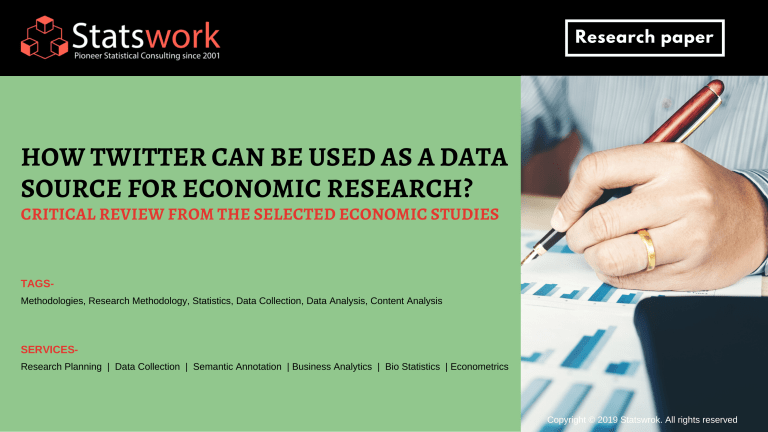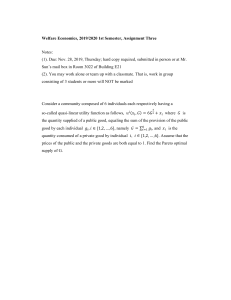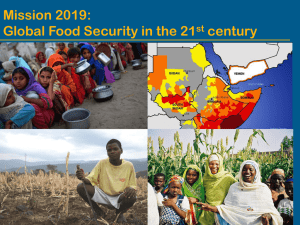
Research paper
HOW TWITTER CAN BE USED AS A DATA
SOURCE FOR ECONOMIC RESEARCH?
CRITICAL REVIEW FROM THE SELECTED ECONOMIC STUDIES
TAGSMethodologies, Research Methodology, Statistics, Data Collection, Data Analysis, Content Analysis
SERVICESResearch Planning | Data Collection | Semantic Annotation | Business Analytics | Bio Statistics | Econometrics
Copyright © 2019 Statswrok. All rights reserved
IN BRIEF
Today online social media platforms such as Twitter, Facebook or YouTube shield a big share of the wideranging digital communication.
Different software tools allow the assemble of information about users and the collection of data about their
communication behavior.
Mainly, the microblog Twitter provides manifold opportunities in data analysis to its functionality and the
availability of appropriate software.
In spite of these chances and a wide range of studies about the use of Twitter for different disciplines, the
analysis of Twitter data and its contextualization within the scope of Foresight projects is hardly discussed in
scientific literature.
Research Planning | Data Collection | Semantic Annotation | Business Analytics | Bio Statistics | Econometrics
Copyright © 2019 Statswrok. All rights reserved
CRITICAL REVIEW FROM
THE SELECTED
ECONOMIC STUDIES
Copyright © 2019 Statswrok. All rights reserved
Research Planning | Data Collection | Semantic Annotation | Business Analytics | Bio Statistics | Econometrics
A critical review on Using Twitter as a data source: an overview of social media
research tools (2019) by Wasim Ahmed.
An influence on latest developments in digital methods, methodologies
for researching Twitter and other social media platforms are presented.
An overview of the main trends in research methodology, specially how
to use Twitter data efficiently in given a multitude of methodologies are
presented.
Along with the list of various methods for coding and examining social
media data, an extensive listing of the tools needed to pull preferred
data from social media accounts are offered – all of which seems a little
scheming for some reason in its language.
Things like disabling difficulty in accessing old data using something
called “web-scraping” is more informative.
Contd..
Copyright © 2019 Statswrok. All rights reserved
Research Planning | Data Collection | Semantic Annotation | Business Analytics | Bio Statistics | Econometrics
AN OVERVIEW OF
TOOLS FOR 2019
Contd..
Copyright © 2019 Statswrok. All rights reserved
Research Planning | Data Collection | Semantic Annotation | Business Analytics | Bio Statistics | Econometrics
Copyright © 2019 Statswrok. All rights reserved
The introductory paragraphs of the reading contains a lot of research methodology – looking at the research
question in more detail, the subjects, determining factors of influence, methodological approach, statistics
together.
The study used a mix of methodological data collection (qualitative and quantitative).
Insertion of standard deviation and mean values began to hold more consequence; reliability scale values;
open-ended, labeled and coded qualitative data – all of which was made more comprehensible having
looked at the Ahmed article which gave an indication of thematic analysis, with the quantitative being of
experimental design.
There are also a number of research methods that author mentioned, such as Netnography and Digital
Ethnography, which deliver frameworks for directing research in the online world.
Netnography, for example, can be based on downloading data straight from a social media platform,
perceiving personal observations of an online community, and interviewing social media users.
Contd..
Research Planning | Data Collection | Semantic Annotation | Business Analytics | Bio Statistics | Econometrics
OVERVIEW
OF
RESEARCH
METHODS
Copyright © 2019 Statswrok. All rights reserved
Research Planning | Data Collection | Semantic Annotation | Business Analytics | Bio Statistics | Econometrics
Copyright © 2019 Statswrok. All rights reserved
In searching the role of the participants explored in this study, the
author would have assumed of how personal history may have
played an important role in consequences of the data analysis.
While social media usage was documented using some
elementary ranked questioning, the author has not mentioned the
impact of a participants passed social media interactions.
Contemplate on how a participant’s associations and reactions
might be transformed if they had practiced cyber-bullying or had
any other important negative interaction on social media in the
years prior to being part of this study.
LIMITATIONS
OF THE
STUDY
Contd.
Research Planning | Data Collection | Semantic Annotation | Business Analytics | Bio Statistics | Econometrics
CONCLUSION
In teacher education, uses of social media include the production and sharing
of content, discussion, and interaction with content analysis, and collaborative
connection with other social media users” (Forbes, 2017).
Users are fortified to use social media to comprehend and communicate ideas
which encourages openness by making research and possessions available to
anybody who is concerned.
Twitter is fetching an avenue for professionals to share their learning, ask
questions, and develop a social network in their field of interest.
Twitter has a particular benefit because of the way that the podium is set up for
academic purposes and it remains the most widespread platform for academic
research. As divergent to Instagram, Facebook, and Snapchat – where they are
keen towards people sharing their own personal experiences, instead of ideas.
Dr. Valerie Irvine’s presence on Twitter as not only bonds information and
research connected to what we are discussing in class, but also involving us to
other people to progress our Personal Learning Network, and engaging in
conversation with peers in the field.
Copyright © 2019 Statswrok. All rights reserved
Research Planning | Data Collection | Semantic Annotation | Business Analytics | Bio Statistics | Econometrics
Copyright © 2019 Statswrok. All rights reserved
CONTACT US
Email Address
GET IN TOUCH
WITH US
Freelancer
info@statswork.com
Consultant
Phone Number
INDIA: +91-4448137070
UK: +44-1143520021
Guest Blog Editor
Email Address
hr@workfoster.com
Research Planning | Data Collection | Semantic Annotation | Business Analytics | Bio Statistics | Econometrics
Copyright © 2019 Statswork. All rights reserved









